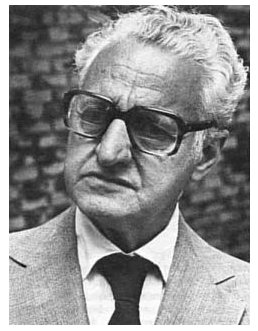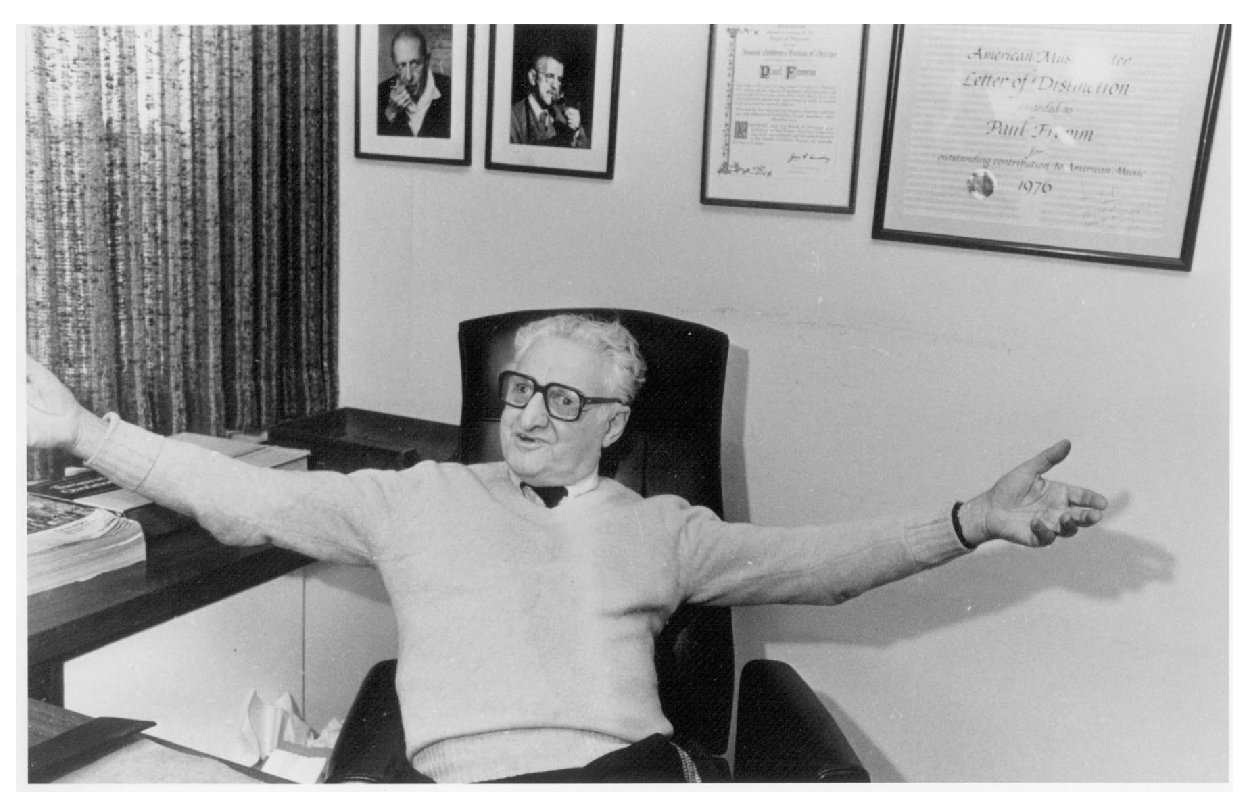 PF
PF PF: It’s a good question and I’ve thought about
it a lot. I think we have to start, first, with informing and educating
an audience. Our audiences really have become the victim of symmetrical
droll disintegration, which really set in the early part of our century,
let’s say about 1910. When I was young, you learned music as a language.
You conceptualized musical history as a kind of evolutionary progression
from one period to the other. Each period had a style of its own.
So you go back to Renaissance, Baroque, Classicism and Romanticism.
In the earlier part of our century you had Post-romanticism, but then all
of a sudden it ended! It’s the era of Pluralism, which means it’s a
very wide spectrum from serialism to hard rock; then on the way you had
Minimalism, Microtonality, aleatoric music, musical theater, you name it,
right? Or Performance Art where you compose the music in performance!
It’s a kind of Conceptual Art. It comes and goes with the performance.
Earlier in this century we were in a transitional state, but now we have
accepted it as a permanent condition. The problem for the listener
is really that he has lost his or her vocabulary. Until the earlier
part of our century, you listened to music and you had certain expectations.
Let’s take Mozart. He had syntax. All he needed was to elevate
the pre-existing structure to its height. But you also have to take
into account that historically, music always was in the state of revolution.
It is always growing.
PF: It’s a good question and I’ve thought about
it a lot. I think we have to start, first, with informing and educating
an audience. Our audiences really have become the victim of symmetrical
droll disintegration, which really set in the early part of our century,
let’s say about 1910. When I was young, you learned music as a language.
You conceptualized musical history as a kind of evolutionary progression
from one period to the other. Each period had a style of its own.
So you go back to Renaissance, Baroque, Classicism and Romanticism.
In the earlier part of our century you had Post-romanticism, but then all
of a sudden it ended! It’s the era of Pluralism, which means it’s a
very wide spectrum from serialism to hard rock; then on the way you had
Minimalism, Microtonality, aleatoric music, musical theater, you name it,
right? Or Performance Art where you compose the music in performance!
It’s a kind of Conceptual Art. It comes and goes with the performance.
Earlier in this century we were in a transitional state, but now we have
accepted it as a permanent condition. The problem for the listener
is really that he has lost his or her vocabulary. Until the earlier
part of our century, you listened to music and you had certain expectations.
Let’s take Mozart. He had syntax. All he needed was to elevate
the pre-existing structure to its height. But you also have to take
into account that historically, music always was in the state of revolution.
It is always growing.
|
PAUL FROMM, CLASSICAL-MUSIC PATRON, IS DEAD
By JOHN ROCKWELL Published: Monday, July 6, 1987, in the New York Times Paul Fromm, a German-born wine importer who became the most active and distinguished private patron of contemporary classical music in the United States, died Saturday at the Bernard Mitchell Hospital of the University of Chicago after a series of heart attacks. He was 80 years old and had lived in Chicago. Through his Fromm Music Foundation, now based at Harvard University, Mr. Fromm dispersed commissions to American composers of every stylistic sort. He also supported performances of new music, especially at the University of Chicago, the Tanglewood Festival (where the ''Fromm week'' of contemporary concerts became an annual tradition) and the Aspen Music Festival. ''We composers have lost our dearest friend and leader,'' said Ralph Shapey, the composer, in a statement. ''He had a total commitment as our champion. He believed in us and dared us to believe in ourselves.'' At an 80th-birthday concert for Mr. Fromm last year in Chicago, Mr. Shapey had called him ''the Esterhazy of the 20th century,'' in reference to Haydn's patron. Earle Brown, a composer and the Fromm Foundation director who will be primarily responsible for its continuance, said yesterday: ''He was the leading sponsor of contemporary music in the United States. His love and support for new music were just extraordinary.'' Family of Vintners Paul Fromm was born on Sept. 28, 1906, in the small Bavarian town of Kitzingen, into a prosperous family of vintners (Erich Fromm, the psychoanalyst and author, was a cousin). Mr. Fromm played four-hand piano duets with his brother Herbert as a child and attended the contemporary-music festivals at Donaueschingen between 1921 and 1926. He later said his first encounter with Stravinsky's ''Sacre du Printemps'' in Frankfurt in 1927 ''made a 20th-century man of me.'' Eventually, Mr. Fromm decided to enter the family business, but even in the 1930's he intended to devote himself to the patronage of modern music. Forced to emigrate in 1938, he arrived in this country on the Fourth of July, married that year and opened the Great Lakes Wine Company in 1940. He became a citizen in 1944, but was well-known for his impenetrable German accent all his life. By 1952, Mr. Fromm felt ready to carry out his musical plans, and began his foundation in Chicago. From the first, he espoused a serious, even Germanic, ideal of elite musical culture. His tastes had been formed during the great early years of modernism, and although he deliberately broadened the stylistic range of music he supported in later years, he never abandoned his principle that great art was a rarefied experience, and that his nurturing should be devoted to work that truly needed it. ''We must realize that serious art does not appeal to everybody,'' he wrote in The New York Times in 1978. ''It never did and it never will. It is up to us to create stimulants to cultural development and to foster an environment that is friendly to creative pursuits. We can do this best not by trying to bring serious art to more people but by educating a more knowledgeable and more devoted minority of art patrons. We must look to them as a nucleus from which a healthy culture can grow.'' Advice From Composers A modest man who once described himself as ''a footnote in musical history,'' Mr. Fromm surrounded himself with composer advisers. At first, he relied primarily on such committed modernists as Milton Babbitt, Elliott Carter and Gunther Schuller. But twice, Mr. Fromm made decisive efforts to diversify his commitments. In 1972, he withdrew his support from Perspectives of New Music, a Princeton-based journal he felt had become too closely identified with the Serialist position. And in 1983, he publicly questioned the narrowness of Mr. Schuller's programming at the Tanglewood Contemporary Music Festival (or ''Fromm week''), withdrawing his support. Mr. Schuller, who resigned a year later on other issues, complained bitterly that Mr. Fromm was ''now opposing everything he ever stood for.'' Undaunted, Mr. Fromm reorganized his foundation, dividing it into three geographical areas and signing on nine new composers as advisers to ensure a wider range of commissions. He also moved his summer festival to Aspen, Colo., and entitled the first series of concerts there in 1984 ''Musical Pluralism in the 1980's.'' Mr. Fromm's annual financing could never match that of the National Endowment or the Rockefeller Foundation. But its steady concentration on contemporary music lent it an influence far beyond its means. In the 1950's, the foundation's annual budget was around $50,000. By the 80's, that figure had risen to $150,000, although it varied from year to year and he was loath to provide exact totals. By now, nearly 200 composers have received commissions, amounting to an honor roll of 20th-century American classical music. Received Many Honors Through all the shifts of musical fashion, Mr. Fromm held true to his faith in the vitality and importance of the music of our time. In one of the many speeches and articles he was asked for in his later years, Mr. Fromm wrote in 1979: ''I am convinced that our century will eventually prove to be one of the great musical centuries. If we choose to ignore what is happening in our midst, it is exclusively our loss.'' In addition to his foundation, Mr. Fromm served at various times as an overseer of the Boston Symphony and a leader of several Chicago charities. His many honors included honorary doctorates from the New England Conservatory and the University of Cincinnati, the Golden Baton Award from the American Symphony Orchestra League and awards from the University of Chicago, the Peabody Institute and the American Music Center. Mr. Fromm is survived by his wife, Erika, a psychologist; a daughter, Joan Greenstone, of Chicago; two grandsons, Michael and Daniel, and his brothers Alfred, of San Francisco, and Herbert, of Brookline, Mass. |
This interview was recorded at the home of Paul Fromm in Chicago
on April 9, 1986. Portions were used (along with recordings) on WNIB
later that year, also in 1991 and 1996. The transcription was made
and posted on this website in 2009.
To see a full list (with links) of interviews which have been transcribed and posted on this website, click here. To read my thoughts on editing these interviews for print, as well as a few other interesting observations, click here.
Award - winning broadcaster Bruce Duffie was with WNIB, Classical 97 in Chicago from 1975 until its final moment as a classical station in February of 2001. His interviews have also appeared in various magazines and journals since 1980, and he now continues his broadcast series on WNUR-FM, as well as on Contemporary Classical Internet Radio.
You are invited to visit his website for more information about his work, including selected transcripts of other interviews, plus a full list of his guests. He would also like to call your attention to the photos and information about his grandfather, who was a pioneer in the automotive field more than a century ago. You may also send him E-Mail with comments, questions and suggestions.